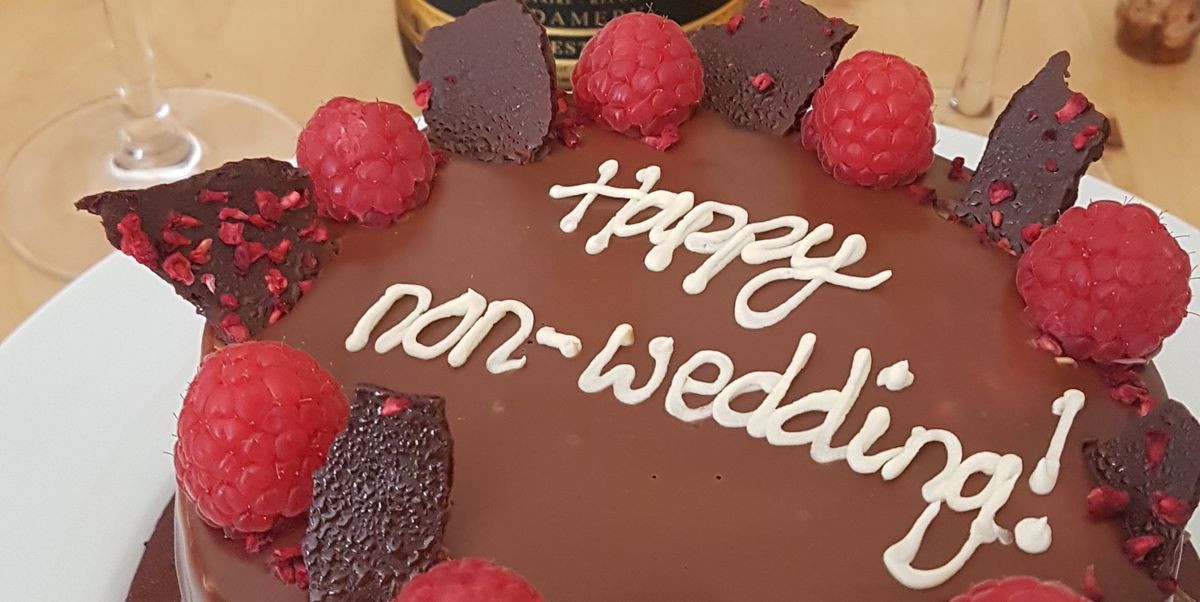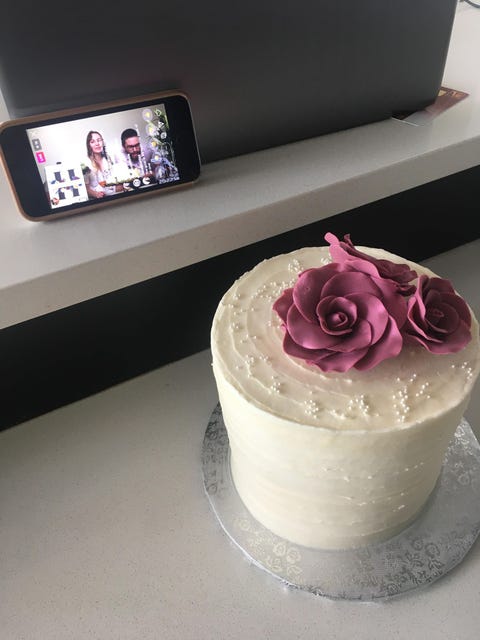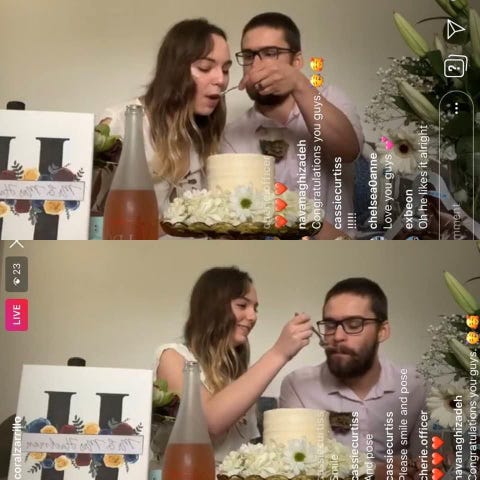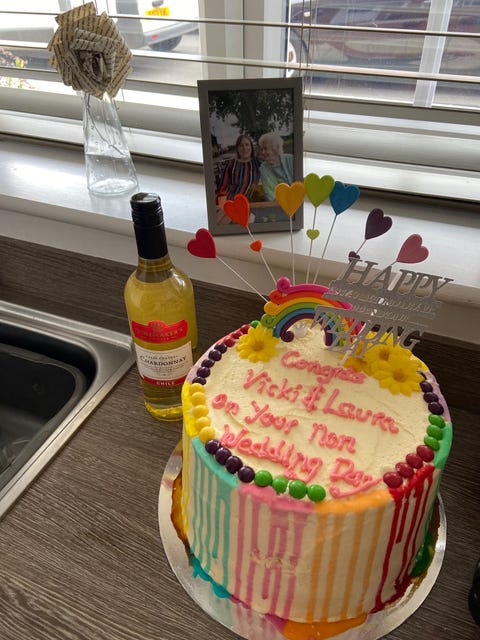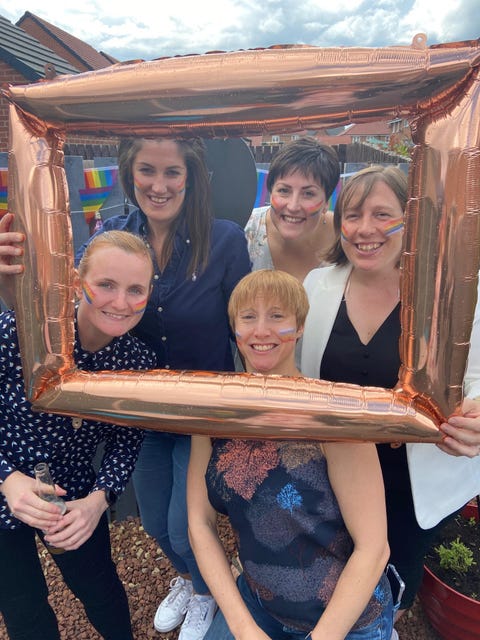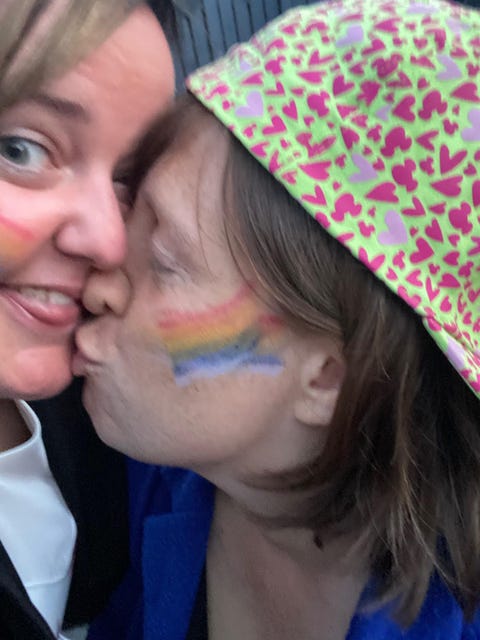Francisca Concha had other plans for June 27. In a perfect world, she would have enjoyed dinner with family on the deck of a boat cruising through canals in the Netherlands after marrying her partner of three years, Vincent. They would’ve ended the day with friends at a bar toasting their new life as a married couple. But instead, when the day rolled around, Concha, 32, and Vincent, 30, ate cake and champagne for breakfast in their two bedroom apartment while quarantining in the U.K., where they live. “We are known for cracking open a bottle of champagne for no particular reason,” Concha says, “so it seemed like the right thing to do.”
It’s a relationship milestone they’ll never forget. As the coronavirus forced the cancellation of large social gatherings, many couples made adjustments—from Zoom weddings to miniaturized, socially-distanced ceremonies—while others, who delayed their nuptials until next year or beyond, are still looking to honor the original day they thought would be their anniversary date for life. For these couples, instead of firing up Netflix for yet another binge sesh, they are choosing to mark the occasion with Non-Wedding Day events with meaningful nods to the day that could’ve been.
“Sometimes we don’t want to remember things that could be considered traumatic or stressful, but I think people are taking things in stride,” says New York City event planner Sojourner Auguste, founder and creative director of Erganic Design. Many of her clients have honored their original wedding date in some way. She’s heard of a couples workout, and others who encouraged family and friends to mail them marital advice to read on their new wedding date. “I haven’t had any couple who’s been, ‘Oh well’” when their original wedding date nears, she says. “Everyone’s acknowledging it even if they don’t have a larger plan in place.”
As June 27 approached, Concha grew sad and frustrated. As the date approached, she thought about how she should have been fussing over last minute details. “Instead I was spending endless days in sweatpants having Zoom meetings,” she says. They had to do something to turn it around and officially say goodbye to a June 27 wedding date: Concha ordered a cake, adorned with “Happy Non-Wedding!” in white icing, and Vincent picked up the champagne. (They’ve since married on August 22 in a civil ceremony and celebrated with a small group of friends.)
Denise Ginley, 32, also had plans to walk down the aisle on June 27, but in April she and her partner, Steven, 31, made the decision to postpone until June 2021. Suspecting they would be bummed that Saturday, they planned a full weekend of activities to distract themselves, including baking a cake, attending a protest in New York City, going on a picnic, and reading letters from family and friends compiled by Ginley’s maid of honor. “When you’re planning the wedding, there are so many norms, guidelines, rules—things that are just always done a certain way—but there is no handbook on what to do when you postpone your wedding,” Ginley says. “It felt like as long as we were pandemic safe, we could plan whatever kind of day we wanted. So we did.”
While the stuffy traditions of yore are changing, marriage has long been considered the ultimate romantic milestone and a social rite of passage. The ring, the dress, the centerpieces, seating arrangements—everything can take on significance, the date included. And when both the logistical and fairy tale plans fall through, it can be a major letdown. “I tell my friends I went through every stage of grief,” says Coral Zarrillo, 25, who’s April 26 wedding in Vancouver, B.C. was postponed until November. As the virus spread in March, Zarrillo and her partner Madison, 24, had to make a quick decision to push their ceremony. Friends were slated to bake the cake and arrange the flowers and rather than leaving them high and dry, Zarrillo tweaked her request and had a small cake and bouquets delivered to her and Madison’s house; she also scheduled an Instagram Live with their family and friends.
Throughout the hour-long stream, the couple answered the popular 36 questions that lead to love, as well as others from their family and friends, and cut the cake. Going through the motions of what would’ve occurred at their actual wedding helped Zarrillo move on. Though she acknowledges the losses so many have experienced during the pandemic, for Zarrillo, shifting her wedding plans was also a loss. “But just like we honor all types of things that we lose, honoring our lost wedding date, I think it’s healthy to do that.”
Although a worldwide crisis hardly inspires warm feelings, Auguste says by celebrating a non-wedding day, couples can fold the pandemic into the metaphorical memory book of their romance. Rather than glossing over the change of plans, it can be cathartic to accept that they’d rather be hosting a party by planning another, much smaller affair. “It’s not like you’re going to wake up and not say ‘This is the day we were supposed to get married,’” Auguste says. “Acknowledge it in a way that’s positive, otherwise it’s going to feel weird.”
Laura McNichol kept as much of her original wedding plans intact as she could, minus the “I Do’s.” Despite postponing her August 2 wedding to 2021, McNichol, 29, and her partner Vicki, 30, hosted both of their families in their backyard in Durham, England for a buffet, cake, and drinks. (Vicki had just converted their barn into a bar.) While they yet don’t have the marriage license, McNichol says their backyard non-wedding day fulfilled every expectation of what a wedding should be—so much so that she’s looking forward to their real wedding next year more than ever. “Weddings and being married take different forms,” McNichol says. “Even though we’re not legally married, we’re happy we could celebrate with people we loved.”
This content is created and maintained by a third party, and imported onto this page to help users provide their email addresses. You may be able to find more information about this and similar content at piano.io
